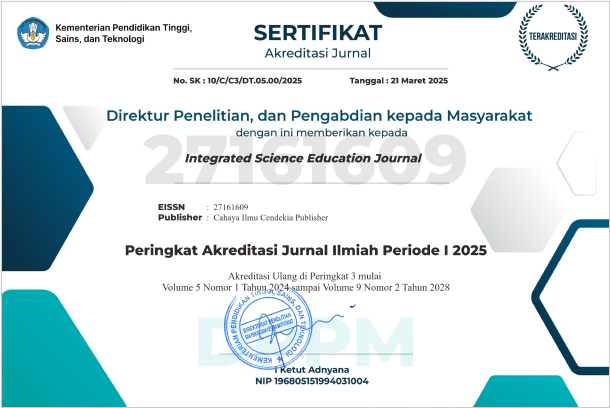Hubungan Antara Karakter Motivasi Belajar dengan Hasil Belajar Siswa
Abstract
Research Objectives: The purpose of this study was to identify the relationship between the character of learning motivation and student learning outcomes. The population of this study were students of class XII MIA SMA Negeri 1 Muaro Jambi. The sample of this study was determined by the total sampling technique, which was 90 students.
Methodology: This research is a quantitative descriptive study with data collection techniques by distributing questionnaires and tests. Questionnaires were used to collect data on students' learning motivation and tests were used to determine learning outcomes. The data analysis technique used is Pearson correlation to see how the relationship between the character of students' motivation and the acquisition of learning outcomes.
Main findings: From the results of data analysis, the Pearson correlation is 0.297, so the correlation is in the high category. Therefore, it can be concluded that the Character of Learning Motivation has a relationship with student learning outcomes.
Novelty of the study: The novelty of this research is to examine the relationship between motivational characters and student learning outcomes
References
D. K. Sari., dan M. Kadri, "The Effect Of Group Investigation Model On Conceptual Knowledge Ontemperature And Heat Materials In Class Xi Smk Muhammadiyah 8 Medan," Jurnal Pendidikan Fisika, vol. 7, no. 2, pp. 76-83, 2018.
A. T. Prasasty, “Pengaruh disiplin dan motivasi belajar terhadap prestasi belajar matematika siswa kelas X SMK Bina Karya Insan Tangerang Selatan,” Util. J. Ilm. Pendidik. dan Ekon., vol. 1, no. 1, pp. 65–74, 2017.
Susanti, Pengembangan e – modul dengan aplikasi kvisoft flipbook maker pada pokok bahasan fluida statis untuk peserta didik sma/ma kelas x. UIN Sunan Kalijaga, 2015.
Maison, Astalini, D. A. Kurniawan, and L. R. Sholihah, “Deskripsi Sikap Siswa Sma Negeri Pada Mata Pelajaran Fisika,” J. Eduasains, vol. 10, no. 1, pp. 160–167, 2018.
P. Rachmadyanti, “Rachmadyanti, P. (2017). Penguatan Pendidikan Karakter Bagi Siswa Sekolah Dasar Melalui Kearifan Lokal. Jurnal Pendidikan Sekolah Dasar, 3(2), 201-214.,” Jpsd, vol. 3, no. 2, pp. 201–214, 2017.
I. Putu Budiarawan, “Hubungan Motivasi Belajar dengan Hasil Belajar Pada Mata Pelajaran Kimia,” J. Pendidik. Kim. Indones., vol. 3, no. 2, pp. 103–111, 2019.
S. Mania, “Teknik Non Tes: Telaah Atas Fungsi Wawancara Dan Kuesioner Dalam Evaluasi Pendidikan,” Lentera Pendidik. J. Ilmu Tarb. dan Kegur., vol. 11, no. 1, pp. 45–54, 2008, doi: 10.24252/lp.2008v11n1a4.
M. G. Ranti, I. Budiarti, and B. N. Trisna, “Pengaruh kemandirian belajar (self regulated learning) terhadap hasil belajar mahasiswa pada mata kuliah struktur aljabar,” Math Didact. J. Pendidik. Mat., vol. 3, no. 1, pp. 75–83, 2017, doi: 10.33654/math.v3i1.57.
J. Wahana and P. Fisika, “Hubungan Antara Sikap Kemandirian Belajar Dan Prestasi Belajar Siswa Kelas X Pada Pembelajaran Fisika Berbasis Portofolio,” WaPFi (Wahana Pendidik. Fis., vol. 1, no. 1, pp. 26–36, 2013.
Copyright (c) 2022 Bella Cantika Putri, Febri Tia Aldila, Maria Marisa Matondang

This work is licensed under a Creative Commons Attribution-NonCommercial 4.0 International License.
Authors who publish with this journal agree to the following terms:
- Authors retain copyright and acknowledge that the Integrated Science Education Journal is the first publisher licensed under a Creative Commons Attribution 4.0 International License.
- Authors are able to enter into separate, additional contractual arrangements for the non-exclusive distribution of the journal's published version of the work (e.g., post it to an institutional repository or publish it in a book), with an acknowledgment of its initial publication in this journal.
- Authors are permitted and encouraged to post their work online (e.g., in institutional repositories or on their website) prior to and during the submission process, as it can lead to productive exchanges and earlier and greater citation of published work.







.png)
.png)






